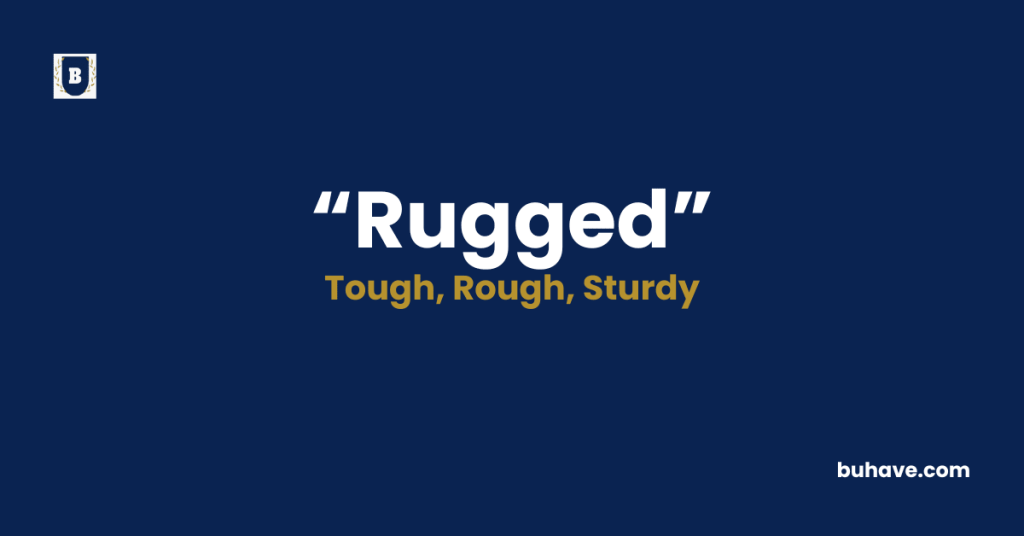The word ‘Rugged’ (Adjective) describes something that is strong, durable, and able to withstand harsh conditions or environments. In this guide, you’ll learn the complete definition, deep etymology, real-life usage, synonyms, antonyms, and frequently asked questions about using “rugged” accurately in everyday language.
Rugged Explained in Depth
A complete and detailed guide to the words Rugged including meaning, definition, examples, etymology, synonyms, and antonyms.
Meanings of Rugged
Rugged describes someone or something that is tough, rough, and resilient often withstanding difficult physical or environmental conditions. It can apply to landscapes, people, objects, or even character traits. For example, a rugged mountain range is one with jagged peaks, rough terrain, and challenging weather conditions. Likewise, a rugged person might be someone who’s physically strong, weathered, and capable of surviving tough situations.
But rugged isn’t only about the physical. It can also describe emotional or inner strength someone who doesn’t break under pressure or who has been through life’s storms and remained standing. In design and technology, the term is often used to describe durable products like rugged laptops, cameras, or tools built to survive drops, dust, water, and more.
Definition
Rugged describes something that appears strong, tough, and built to endure. This word often refers to things like landscapes, objects, or even people that can handle rough conditions without breaking down.
For instance, a rugged mountain has sharp edges and steep cliffs it’s not smooth or easy to cross, but it’s powerful and awe-inspiring. Similarly, when we describe a person as rugged, we often mean they look strong, resilient, and maybe a bit rough around the edges, like someone who works outdoors or faces challenges head-on.
Etymology
The word “rugged” comes from Middle English rugged or ruggede, meaning “rough or coarse.” Its earliest roots trace back to the Old Norse word rogg, which suggested something shaggy, bristly, or wild in appearance—like rough hair or an uneven surface. Related words appear in Scandinavian languages describing things that are jagged or untamed.
Over the centuries, it evolved in English to apply not only to geography but to personality and character. By the 18th and 19th centuries, literature began using “rugged” to describe hardy, self-reliant individuals—especially those who lived close to nature or led challenging lives. It later expanded to mechanical and industrial uses, describing equipment and tools made to withstand rough handling.
Thus, the word maintains its core theme of roughness, strength, and durability—across natural, personal, and technical contexts.
Example Sentences
- The hikers climbed the rugged cliffs with determination and care.
- He had a rugged face, lined from years of outdoor labor and weather.
- This rugged smartphone can survive falls, water, and extreme temperatures.
- Despite the rugged path, they pressed on toward the summit.
- Her rugged personality helped her thrive in a demanding industry.
Rugged Synonyms
- Sturdy
- Durable
- Tough
- Weathered
- Hardy
- Resilient
- Coarse
- Rough
- Craggy
- Solid
Rugged Antonyms
- Smooth
- Delicate
- Fragile
- Weak
- Polished
- Elegant
- Gentle
- Flimsy
- Soft
- Refined
FAQs about Rugged
Here are some frequently asked questions (FAQs) about the word “Rugged”
1. What does “rugged” mean in everyday language?
In everyday use, “rugged” typically means something or someone that is tough, durable, and built to handle rough conditions whether it’s a trail, a vehicle, or a person’s character.
2. Can “rugged” describe a person’s looks?
Yes, “rugged” is often used to describe a strong or masculine appearance, typically marked by features like a stubbled jaw, weathered skin, or a solid build.
3. What are rugged devices?
Rugged devices, like laptops or phones, are built to survive extreme environments. They’re resistant to drops, dust, water, and temperature extremes—perfect for fieldwork, factories, or the outdoors.
4. Is “rugged” always positive?
Usually, yes. “Rugged” tends to carry a tone of admiration for strength and resilience, though it can also imply something is rough or lacking polish.
5. How is “rugged” different from “tough”?
“Tough” can describe inner or outer strength in a broader sense, while “rugged” often suggests a natural or raw kind of durability something more physical or environmental.

















